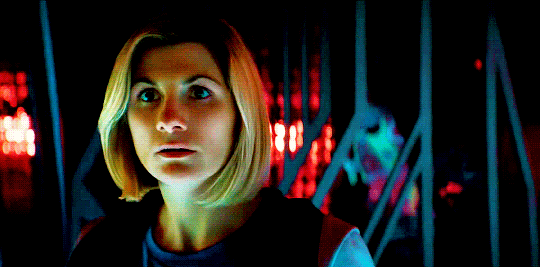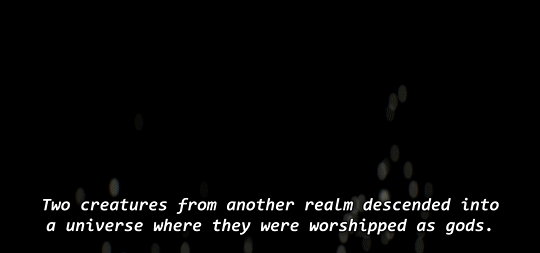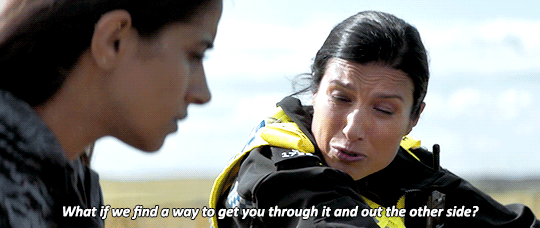“Can You Hear Me?” deals with mental health more explicitly than perhaps any other Doctor Who episode but does so within a lackluster story. Just like with many other Thirteenth Doctor era stories, the idea and the message they’re trying to convey are all good but the execution leaves something to be desired. To be fair to this episode in particular, “Can You Hear Me?” could have been much stronger just by previous build-up regarding the companions and their lives outside the TARDIS. That being said, it’s still a remarkable episode of television in how it at least attempts to start a conversation about important issues. The three companions who have a much bigger role than previously and it’s a welcome change.
The Eternals have their games
We’re going to talk about how mental health was handled but first, let’s look at the two villains and how their schemes forced others to face their fears. It’s such a shame how underwhelming this aspect of the story turned out to be. The idea of two immortals toying with entire civilizations and betting on their demise for their own amusement is such a good concept. It’s really quite upsetting how badly Charlene James and Chibnall wasted this opportunity. As it stands, the story of Zellin (Ian Gelder) and Rakaya (Clare-Hope Ashitey) is okay but it’s little more than a weak way to present mental health issues.
A big problem for the episode is pacing. It’s off to a good start but the majority just stagnates so much, despite the reveal about the immortal gods and the characters’ nightmares. For such a disturbing and interesting concept, there’s no tension in the scenes with the immortals. Yes, Zellin’s fingers are creepy and the callousness of the gods is the stuff of nightmares itself. The acting is quite good, not the best we’ve seen this season but Gelder especially brings out the best of his character. And yet, the stakes are so low that we need not worry when the gods make their way to Earth. Not just because it’s Doctor Who and the Doctor will inevitably prevail but because we don’t fear these immortals fueled by terror. In that, they fail as effective villains.
Look, it’s not like the gods are terribly executed or that the middle of “Can You Hear Me?” is a complete snoozefest. It’s just so much less interesting and captivating as it could have been. These two characters and their motivations could have been such a great backdrop to the exploration of companions and their fears. I can’t help but feel that something like this would have had so much more impact under Moffat. The disturbing immortal game at least, the emotional side of things was quite well handled as it was.
What you fear the most
What makes the gods storyline so disappointing is that what they were doing with the companions is so good. From the very start, we’re back to Sheffield and we finally get to see the fam get back to their regular lives in-between adventures. In Graham’s case, it’s two friends we haven’t seen yet but we get a sense of their dynamic from the little we see. Ryan visits his mate Tibo (Buom Tihngang), first seen in “Spyfall”, and Yaz goes home to her sister Sonya (Bhavnisha Parmar). They get to spend some time away from each other and the Doctor, and as good as it is to see the fam together it’s refreshing when they get to be individuals.
The Doctor’s moments don’t hit quite as hard as the companions’ but there’s still substance there. We get an extended Timeless Child sequence, though we’re not much closer to finding out what the mystery is about. The real power of exploring the characters’ worst fears is what those fears reveal about them and in the case of the Doctor, we see how haunted she is by the Master’s warning. It might not be brand new information but it takes us yet another step closer to the finale. We also see how dependant Thirteen is on her companions, she can’t help but talk as if they’re there even when they aren’t. Her not noticing that the fam went off to be trapped in their own minds was a bit much, though.
Graham’s nightmare is about Grace and the fear that his cancer might return. I love that Sharon D Clarke returns as Grace once again, it’s only fair that we see her in visions and parallel worlds after she was so rudely fridged in her first episode. It is quite cruel to Graham, in a way, but in another, it’s good to see him remember his wife. It’s also so important that in an episode about mental health we don’t forget about what Graham went through because of cancer. This isn’t the first time it was mentioned but perhaps the first when it’s given proper weight and consideration. He even gathers the strength to talk to the Doctor about it and that’s powerful, no matter how awkwardly the Doctor handles it.
Ryan’s story focuses on his friendship with Tibo and touches on a downside of traveling with the Doctor. To a certain extent, we see this with Graham and Yaz too, but it’s through Ryan that we begin to wonder when the fam might leave the Doctor. It’s great to see Ryan have a meaningful relationship with someone outside the TARDIS and he proves his worth as a friend. In his nightmare, he sees a burning Earth with Dregs and an old Tibo. As frustrating as “Orphan 55″ was, at least the episode has consequences. It’s understandable that those events affected Ryan the most and this nightmare is a unique insight into his character. As a fitting end, Ryan convinces Tibo to get help for how he’s feeling.
All of these stories are important and impactful but arguably Yaz is the character who got the strongest story. We previously found out that she was bullied in school but that throwaway line develops into something much more sinister as the episode slowly reveals more about her past. It’s only after her dinner with her sister and her nightmares that we get a flashback to Yaz from three years ago, in the middle of nowhere and running away. A police officer finds her after Sonya calls them and the conversation they have is the highlight of the episode for me.
It’s so heartfelt yet heavy with the implications of what Yaz would have done without this intervention. It all but tells us that this woman is the reason why Yaz became a police officer and it recontextualizes many previous scenes. Yaz’s wanderlust and recklessness take on new meanings and we appreciate all the more when she finds her way to this woman’s house three years later and gives her a 50p coin. Truly a beautiful story and though it is weakened by the context of the episode and the lack of build-up, it’s still oh so important.
Lack of build-up is a genuine issue with these character moments, however, and it doesn’t take away much but still reminds us that these scenes could have carried more meaning. If only Graham’s cancer played a bigger role, even if only in terms of his character. If only we saw more of Tibo before this episode. Hell, if only we heard Ryan talk about him between “Spyfall” and now, wondering how he was doing. If only Yaz’s flashback had more clues scattered throughout previous episodes to lean on. It’s good that we’re seeing more of the companions now and exploring their characters but so little was needed for these emotional punches to be much stronger.
Tahira and Aleppo
As a closing thought before a conclusion about the episode as a whole, I wanted to mention Tahira (Aruhan Galieva) and the Aleppo storyline. I didn’t expect a full-fledged historical when I found out that part of the episode is set in Aleppo, 1380. We’re getting that with Byron and Mary Shelley next week anyway. But I did expect that setting to play a bigger role and it was ultimately all but unnecessary. Tahira started out as an interesting character and the events in Aleppo set the tone for a scary episode but the very beginning was also the best bit. After that, the Doctor finds Tahira and they only return to Aleppo at the very end to punish the gods. Oh boy, we could also get into the uncharacteristically cruel punishment from the Doctor, but the episode sure as hell didn’t want to dwell on it.
I appreciate how Aleppo is relevant to the mental health message but there’s so much more that could have been done with that. I can once again only say that the issue is pacing, I just don’t know where the middle of the episode went but it could have been spent in Aleppo instead. It’s rather frustrating when we have such good ideas and a very important emotional heartbeat to the story but the villains and a unique setting all underwhelm.

I wish I liked “Can You Hear Me?” more, I really do. The ideas are there and the way mental health is portrayed is incredibly important but it’s somewhat undermined by how weak the story itself is in the end. Wasted villains, wasted setting, no build-up in previous episodes to companion moments, awkward pacing. Still, I can’t help but deeply appreciate what they were going for. At the very least, even if it’s not outstanding as an episode, maybe “Can You Hear Me?” can start a conversation about mental health. Not that there isn’t a conversation going on already, thankfully the stigma’s disappearing, but maybe Doctor Who can help. If so, then I can live with a weaker episode with strong themes.



